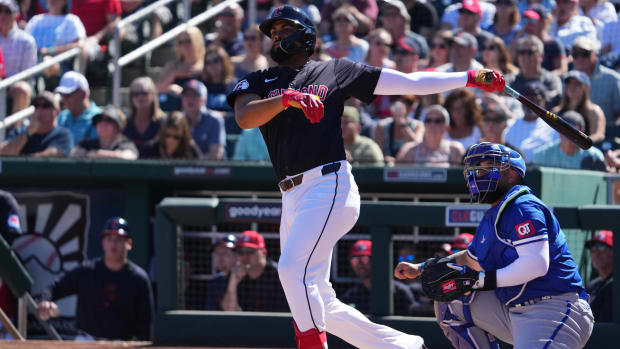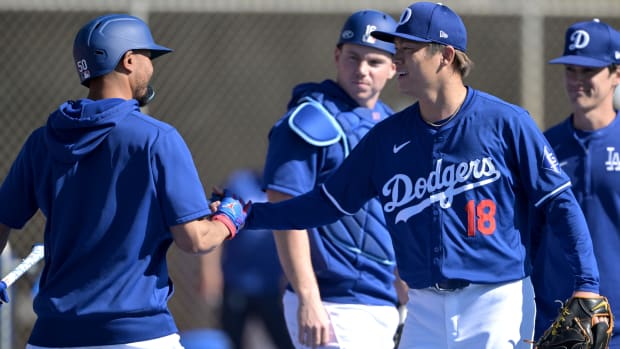Q&A: Tom Verducci talks about Fox's World Series Game 1 power outage
There has never been a game quite like Game 1 of the 2015 World Series. It was the second-longest in the 111-year history of the Fall Classic by time (five hours, nine minutes), and its 14 innings tied the record set in 1916 and matched in 2005. It will be remembered for its wild twists, including Alcides Escobar's inside-the-park home run to lead off the bottom of the first and Alex Gordon's game-tying home run in the bottom of the ninth in a game the Royalsultimately won, 5–4, over the Mets.
It will also be remembered for the bizarre stretch that started in the bottom of the fourth inning: Fox, broadcasting the game nationwide, lost its feed when the power went out in both its primary and its backup generator. The network would later attribute the mishap to “a rare electronics failure.” The game was briefly halted because the outage compromised the managers’ ability to use replay; when it resumed a few minutes later, it was temporarily broadcast through the MLB International feed while Fox and its team scrambled to restore order.
No men had a better vantage point—or were more in the dark—than the three who were calling the game for Fox: lead announcer Joe Buck and color commentators Harold Reynolds and Tom Verducci, the latter of whom is also a Sports Illustrated senior writer. I spoke with Verducci before Game 2 about what was going on inside the booth when the power went out.
• MORE MLB: Full postseason schedule, start times, TV listings
Ted Keith: When did you first notice something was wrong?
Tom Verducci: When the monitors in front of us and the sound in the headsets went out. We had no idea what was going on and no communication with the truck.
What we did at first was just continue to call the game because we weren’t sure if the sound was still going out there. So we did that for a couple batters, but when it was clear nothing was going out, we shut it down. I got a text from somebody saying the truck was down, and at that point we took our headsets off and we became spectators.
TK: What was the feeling in the booth?
Life and death provided backdrop for wild, historic World Series opener
TV: It was very strange. There was nothing we could do. For us, it was really like sitting in the stands. Shortly after that, they told us to go two booths down to the MLB International booth, which was really odd.
It was pretty awkward. It almost reminded me of those scenes in a movie when a policeman gets his vehicle stolen and he has to commandeer one from going a civilian vehicle going down the street. That’s what we had to do to [play-by-play announcer] Matt [Vasgersian] and [color commentator] John [Smoltz].
TK: Did they know what was going on?
TV: Yeah, they had been notified. In fact, when we got back on the air, Matt stayed on to make the transition to Joe, but it was definitely odd.
We stayed in that booth for, really, I think it was only a half inning. When we got up and running with our truck, we went back.
TK: Had you ever experienced anything like this in your broadcasting career?
Royals, determined to finish the job this time, outlast Mets in Game 1
TV: Nothing like this had happened before. I was at two different games this year where there were power failures in the stadium. Hopefully it doesn’t happen again. These things happen, though, whether it’s your dishwasher or your microwave or a billion-dollar broadcasting network. Sometimes things break.
TK: Is there a plan in place to prevent this from happening again?
TV: No, there’s not. There is a backup emergency plan in terms of power, but all the generators went out. In terms of our protocols, this was just making decisions on the fly.
• MORE MLB: A-Rod talks about joining Fox's postseason analyst crew
TK: Did it throw off the broadcast?
TV: No. It was just weird because as soon as you’re back on, you’re part of the rhythm of it again. It was pretty seamless to get back. It was business as usual.
TK: Joe Buck is certainly the most experienced of the three of you. How did he handle it?
Veteran Young, in first World Series appearance, is Royals’ unlikely hero
TV: He’s the ultimate pro’s pro. The amazing thing about him is he’s always calling these huge important events, and to me, it’s the equivalent of a running back never fumbling the football. Whatever the equivalent is in broadcasting, he does. I think he had the line of the night: “We didn’t bring enough quarters to put in the generator.” He handled everything as coolly as possible.
TK: Did you get any information afterward as to what happened and why the outage occurred?
TV: We didn’t get much of the technical information because there’s nothing we could have done about it. All we knew was the truck was down, and all we needed to know was when the truck was back up. We did not dive deeply into the mechanics.
TK: Is there a new plan in place for the rest of the World Series should something like this happen again, or is the assumption that it was just a fluke event that won’t be repeated?
TV: I think they’re working on the premise that everything is back to normal. We did not talk about what happened, at least not yet.
TK: You just wrote a long story about how the broadcast of Game 6 of the 1975 World Series changed sports on television forever. Do you think this will have any long-lasting impact?
TV: My first reaction was that in this day and age, when things break down like that, it possibly is hacking, that maybe somebody intentionally caused harm to the grid. No, I hope this is not the beginning of a trend, both for the viewers and the broadcasters.
In a weird way, it just contributed to the oddity of the night. There was a vibe about this game, and it was off-center. Everything about that game was memorable in a very weird way.


































